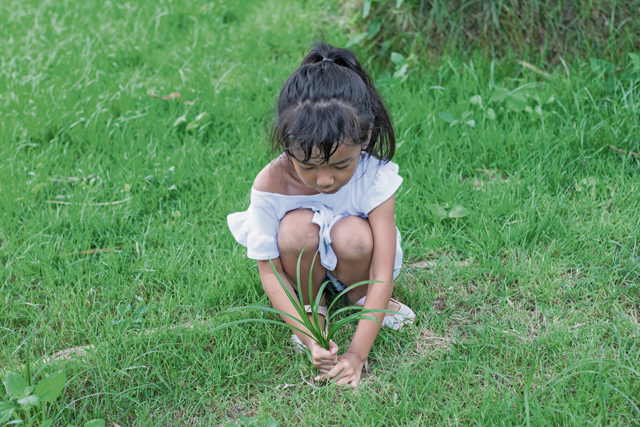
Spring has sprung! Birds are chirping, bees are humming and flowers are popping up everywhere! Indoors, however, the climate has more of a perfect storm vibe — junky, chaotic, cluttered. Well, grab a broom —
or better yet — shove a broom into your 10 year old’s hands and let’s get to work! Here are some household chores based on age group to get everyone in the family tidying up like Mary Poppins!
Toddlers and Preschoolers – Even the tiniest of kiddos can start to learn about responsibility. Small children actually love lending a hand. The key is to make sure the chore matches their readiness level. Natural consequences are a great place to start. This is not punishing someone for making a mess, but involving them in the solution to the mess. For example, if your two year old spills some milk, simply say, “Uh-oh, I see there’s milk on the table. Let’s wipe it up” — handing a towel to your child in a cheerful way. If a toddler tosses their carrots on the floor, guide them to pick them up and place them in the trash. “Now our floor is clean!” Your preschoolers are completely capable of chores that involve putting in and taking out. Carrying their own dishes to the sink, putting toys in a toy box, taking the dirty towels out of the bathroom to the laundry room, empty wastebaskets, etc.
Early Elementary School – These are your kindergarteners, first and second graders. The word Helper is still really powerful with this age group. Have your child be in charge of wiping off the table after meals, spraying the household plants with a spray bottle, filling the dog’s water dish. Your child will feel good about making a contribution to the family. They are helping the family have a clean table for the next meal. Keeping the plants happy and alive. Giving the beloved family pet a fresh drink. For spring specific tasks, pulling weeds is pretty straight forward and helps the flowers have space to grow. Packing up winter clothes to put in the attic involves sorting and makes space for our swimsuits and shorts! Sweeping, vacuuming and loading the dishwasher are also realistic chores for this age group. Don’t forget to have your child be responsible for keeping a tidy room!
Intermediate Elementary School – Children in the range of nine to twelve years should be fully capable of responsible behavior. Packing their own backpack, sorting laundry, making and packing lunch. These are all realistic day to day chores. Clearing away is really gratifying at this age. Moping floors, raking leaves, sweep the outdoor steps. Sorting is also age appropriate and satisfying work — emptying the silverware tray from the dishwasher, helping find matching socks in the clean laundry basket, stacking canned food on the shelf. For a spring cleaning overhaul, these elementary aged kids are ready for some altruism. Have your child fill up a whole box of toys to donate to a needy child. To truly foster kindness and selflessness, however, be sure not to “reward” this gesture with a tangible item. Extrinsic rewards can undermine internal kindness. Instead, reflect on the experience and use growth mindset praise. For example, “Wow – there are so many toys in this box for a child who does not have toys. What do you think about that?”
Middle and High School – Your teenagers are very capable of more rigorous chores, but may not be ready for the tasks that require keen judgment and complex problem solving. Think: allow the teenager to mow the lawn, but maybe don’t let them do any maintenance on the mower, like un-jamming the blade. Examples of realistic weekly chores include washing the windows, walking the dog, washing the car, setting the table, stripping the sheets from the beds and starting the laundry machine. Trust me, you want your teens to know how to do a load of laundry, so they’re not visiting you when they’re 22 just to raid your fridge and have you wash their skivvies! An important, albeit tricky, part of this is follow-through. Teens can use chore apps to be self-accountable for their tasks. Paid jobs are also age appropriate and motivating. Offer your teen a set sticker price for heavy duty work, like removing the junk from the basement to take to the dump. Babysitting siblings is also a great way for your teen to learn responsibility and earn some fun money. If you are not keen on monetary payment, you can also use privileges as a motivator.
A few words of advice – keep your expectations realistic. It’s better to have your child enthusiastically participate while doing a so-so job. Perfection does not exist. Praise always feels good, so keep the positive words flowing! Be specific with your instructions — e.g. “Pick up all of the dirty clothes on your bedroom floor and put them in the hamper” instead of “Clean your room.” A Chore Chart can be a useful tool. In addition to your day to day chart, you may include a special spring cleaning chart for the big overhaul jobs. Happy Spring (Cleaning)!
Author’s profile: Lisa Helenius is a practicing occupational therapist with over 25 years of pediatric experience. She currently is a partner at Growing Up Therapy. See https://growinguptherapy.com for more information.







